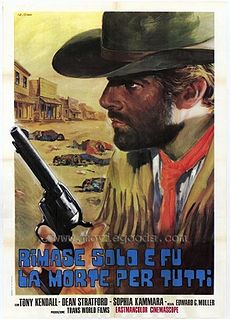Rimase uno solo e fu la morte per tutti!: Difference between revisions
No edit summary |
mNo edit summary |
||
| Line 14: | Line 14: | ||
== Cast and crew == | == Cast and crew == | ||
*'''Cast:''' [[:Category:Tony Kendall|Tony Kendall]] (Dakota Thompson), James Rogers (Slim Thompson), Dino Strano [as Dean Stratford] (Alvarez), Sophia Kammara (Jane), Omero Gargano (Donovan), Nino Musco (barman), Attilio Dottesio (Prison director), Vincenzo Maggio (Bank director), Bruno Boschetti, Franco Marletta, Sergio Sagnotti (Alvarez henchman), Mimmo Maggio (Alvarez henchman), Fortunato Arena (Jackson), Luciano Conti, Michele Branca, Enzo Pulcrano (Alvarez henchman), Celso Faria (Sheriff of Santa Cruz), Giovanni Sabbatini (Judge), Omero Capanna (Man in Courtroom with Jane) | *'''Cast:''' [[:Category:Tony Kendall|Tony Kendall]] (Bill 'Dakota' Thompson), James Rogers (Slim Thompson), Dino Strano [as Dean Stratford](Alvarez), Sophia Kammara (Jane), Omero Gargano (Donovan), Nino Musco (Santa Cruz barman), Attilio Dottesio (Prison director), Vincenzo Maggio (Bank director), Bruno Boschetti (deputy at trial), Franco Marletta, Sergio Sagnotti (Alvarez henchman), Mimmo Maggio (Alvarez henchman), Fortunato Arena (Jackson), Luciano Conti (Alvarez henchman), Michele Branca (Alvarez henchman), Enzo Pulcrano (Alvarez henchman), Celso Faria (Sheriff of Santa Cruz), Giovanni Sabbatini (Judge), Omero Capanna (Man in Courtroom with Jane), Benito Pacifico (Alvarez henchman), Calogero Caruana (Alvarez henchman) | ||
*'''Story:''' Alessandro Schirò | *'''Story:''' Alessandro Schirò | ||
*'''Screenplay:''' Edoardo Mulargia, Alessandro Schirò | *'''Screenplay:''' Edoardo Mulargia, Alessandro Schirò | ||
*'''Cinematography:''' Antonio Modica [Eastmancolor | *'''Cinematography:''' Antonio Modica [Eastmancolor - Panoramico 1,66:1] | ||
*'''Music:''' [[:Category:Felice Di Stefano|Felice Di Stefano]] + [[:Category:Gianfranco Di Stefano|Gianfranco Di Stefano]] | *'''Music:''' [[:Category:Felice Di Stefano|Felice Di Stefano]] + [[:Category:Gianfranco Di Stefano|Gianfranco Di Stefano]] | ||
==Synopsis== | ==Synopsis== | ||
Dakota, a sheriff, is framed by a band of outlaws and sentenced to life imprisonment. He breaks out of jail helped by his brother. At large, the two brothers eliminate the whole gang and | Dakota, a sheriff, is framed by a band of outlaws and sentenced to life imprisonment. He breaks out of jail helped by his brother. At large, the two brothers set out to eliminate the whole gang and prove his innocence. | ||
==Comment== | ==Comment== | ||
A weak western from the otherwise always reliable Edoardo Mulargia. | A weak western from the otherwise always reliable Edoardo Mulargia. The screenplay looks like a patchwork of leftovers from other scripts, it seems often that there are whole parts missing. Oddly enough there are several other scenes which seem to go on forever without any necessity. The acting is also rather poor, whereas the best parts of the score were directly taken from Mulargia's SW debut [[Perché_uccidi_ancora|Perche uccidi ancora?]] (1965). | ||
The screenplay looks like a patchwork of leftovers from other scripts, it seems often that there are whole parts missing. Oddly enough there are several other scenes which seem to go on forever without any necessity. The acting is also rather poor, whereas the best parts of the score were directly taken from Mulargia's SW debut [[Perché_uccidi_ancora|Perche uccidi ancora?]] (1965). | |||
by Stanton | by Stanton | ||
| Line 34: | Line 33: | ||
[[Category:1971]][[Category:Italy]] | [[Category:1971]][[Category:Italy]] | ||
[[Category:Edoardo Mulargia]] | [[Category:Edoardo Mulargia]][[Category:Felice Di Stefano]][[Category:Gianfranco Di Stefano]] | ||
[[Category:Felice Di Stefano]] | [[Category:Tony Kendall]][[Category:Dino Strano]][[Category:Omero Gargano]][[Category:Fortunato Arena]][[Category:Luciano Conti]][[Category:Attilio Dottesio]][[Category:Bruno Boschetti]][[Category:Mimmo Maggio]][[Category:Nino Musco]][[Category:Celso Faria]][[Category:Giovanni Sabbatini]][[Category:Omero Capanna]][[Category:Benito Pacifico]] | ||
[[Category:Gianfranco Di Stefano]] | |||
[[Category:Tony Kendall]] | |||
[[Category:Dino Strano]] | |||
[[Category:Fortunato Arena]] | |||
[[Category: | |||
[[Category:Attilio Dottesio]] | |||
[[Category:Mimmo Maggio]] | |||
[[Category:Nino Musco]] | |||
[[Category:Celso Faria]] | |||
__NOTOC__ | __NOTOC__ | ||
Revision as of 23:35, 23 November 2014
Rimase uno solo e fu la morte per tutti! (Italy 1971 / Director: Edoardo Mulargia)

|
| Contents: |
- Runtime: 82 min
- Release Date: 19.2.1971
Also known as
Brother Outlaw (U.S.A.) | Dakota - Nur der Colt war sein Gesetz (Germany) | Schwur des Geächteten (Germany) | Irmão Fora da Lei (Brazil) | Duel i Tombstone (Danish) | Le pistolero de Tombstone (France) | Solo y fuera de la ley (Spain) | La muerte fue para todos (Spain) | Lainsuojaton (Finland) | Dakota
Cast and crew
- Cast: Tony Kendall (Bill 'Dakota' Thompson), James Rogers (Slim Thompson), Dino Strano [as Dean Stratford](Alvarez), Sophia Kammara (Jane), Omero Gargano (Donovan), Nino Musco (Santa Cruz barman), Attilio Dottesio (Prison director), Vincenzo Maggio (Bank director), Bruno Boschetti (deputy at trial), Franco Marletta, Sergio Sagnotti (Alvarez henchman), Mimmo Maggio (Alvarez henchman), Fortunato Arena (Jackson), Luciano Conti (Alvarez henchman), Michele Branca (Alvarez henchman), Enzo Pulcrano (Alvarez henchman), Celso Faria (Sheriff of Santa Cruz), Giovanni Sabbatini (Judge), Omero Capanna (Man in Courtroom with Jane), Benito Pacifico (Alvarez henchman), Calogero Caruana (Alvarez henchman)
- Story: Alessandro Schirò
- Screenplay: Edoardo Mulargia, Alessandro Schirò
- Cinematography: Antonio Modica [Eastmancolor - Panoramico 1,66:1]
- Music: Felice Di Stefano + Gianfranco Di Stefano
Synopsis
Dakota, a sheriff, is framed by a band of outlaws and sentenced to life imprisonment. He breaks out of jail helped by his brother. At large, the two brothers set out to eliminate the whole gang and prove his innocence.
Comment
A weak western from the otherwise always reliable Edoardo Mulargia. The screenplay looks like a patchwork of leftovers from other scripts, it seems often that there are whole parts missing. Oddly enough there are several other scenes which seem to go on forever without any necessity. The acting is also rather poor, whereas the best parts of the score were directly taken from Mulargia's SW debut Perche uccidi ancora? (1965).
by Stanton



